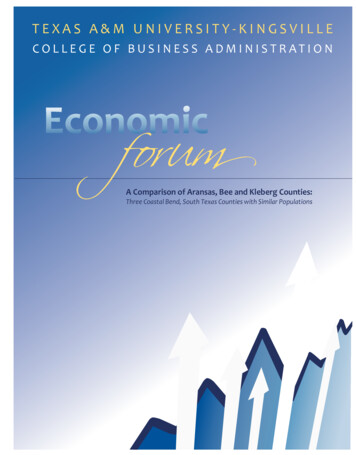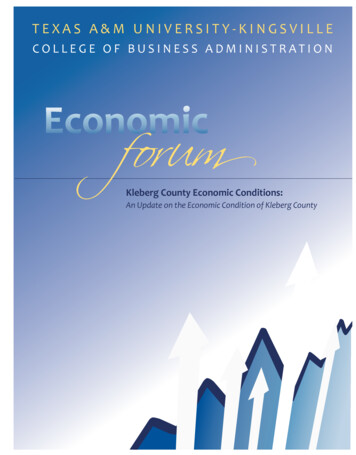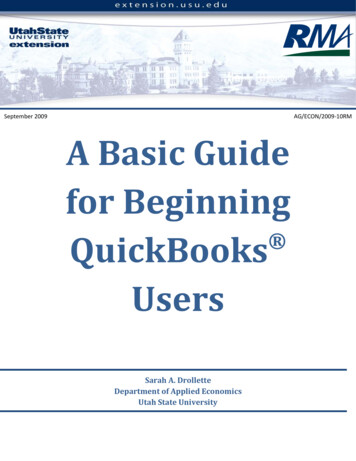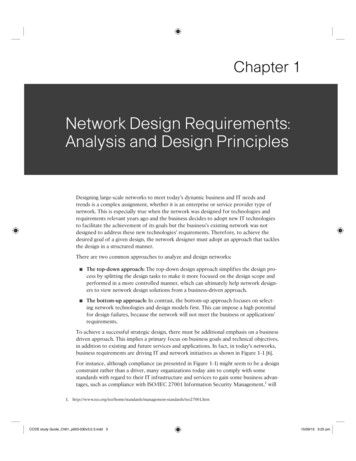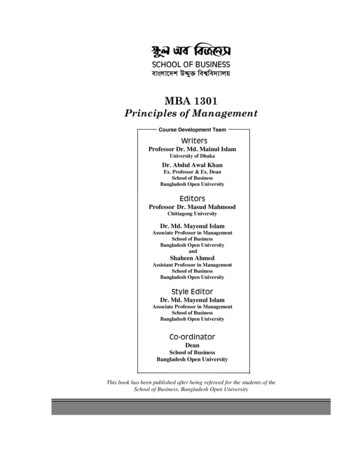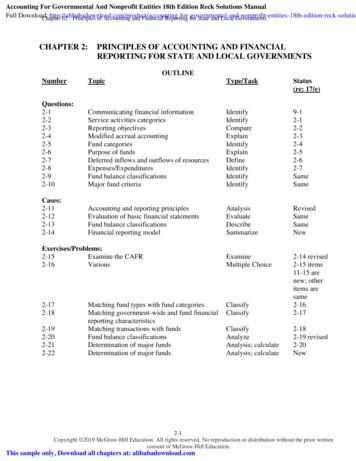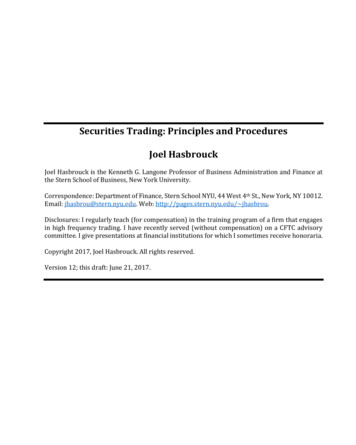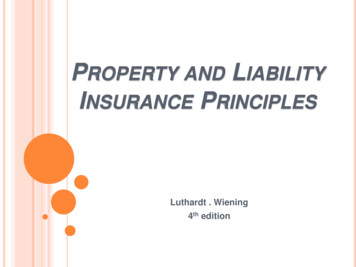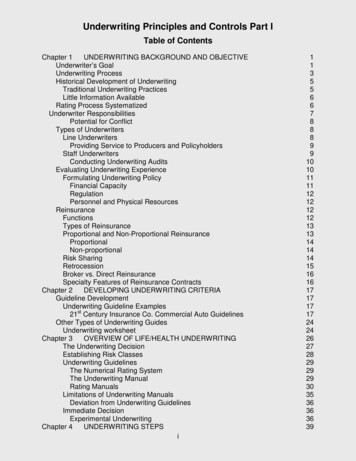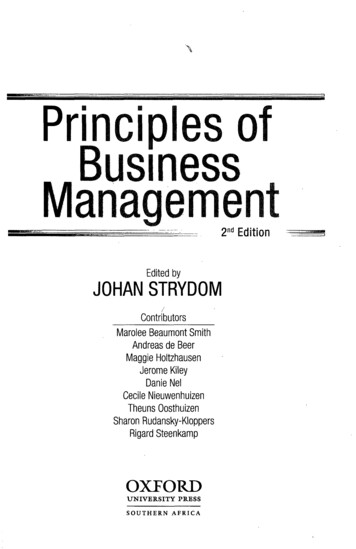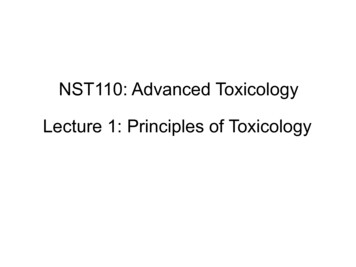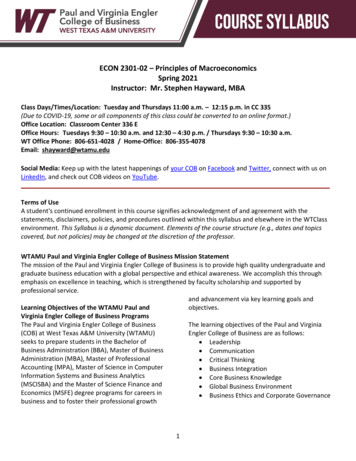
Transcription
ECON 2301-02 – Principles of MacroeconomicsSpring 2021Instructor: Mr. Stephen Hayward, MBAClass Days/Times/Location: Tuesday and Thursdays 11:00 a.m. – 12:15 p.m. in CC 335(Due to COVID-19, some or all components of this class could be converted to an online format.)Office Location: Classroom Center 336 EOffice Hours: Tuesdays 9:30 – 10:30 a.m. and 12:30 – 4:30 p.m. / Thursdays 9:30 – 10:30 a.m.WT Office Phone: 806-651-4028 / Home-Office: 806-355-4078Email: shayward@wtamu.eduSocial Media: Keep up with the latest happenings of your COB on Facebook and Twitter, connect with us onLinkedIn, and check out COB videos on YouTube.Terms of UseA student's continued enrollment in this course signifies acknowledgment of and agreement with thestatements, disclaimers, policies, and procedures outlined within this syllabus and elsewhere in the WTClassenvironment. This Syllabus is a dynamic document. Elements of the course structure (e.g., dates and topicscovered, but not policies) may be changed at the discretion of the professor.WTAMU Paul and Virginia Engler College of Business Mission StatementThe mission of the Paul and Virginia Engler College of Business is to provide high quality undergraduate andgraduate business education with a global perspective and ethical awareness. We accomplish this throughemphasis on excellence in teaching, which is strengthened by faculty scholarship and supported byprofessional service.and advancement via key learning goals andobjectives.Learning Objectives of the WTAMU Paul andVirginia Engler College of Business ProgramsThe learning objectives of the Paul and VirginiaThe Paul and Virginia Engler College of BusinessEngler College of Business are as follows:(COB) at West Texas A&M University (WTAMU)seeks to prepare students in the Bachelor of LeadershipBusiness Administration (BBA), Master of Business CommunicationAdministration (MBA), Master of Professional Critical ThinkingAccounting (MPA), Master of Science in Computer Business IntegrationInformation Systems and Business Analytics Core Business Knowledge(MSCISBA) and the Master of Science Finance and Global Business EnvironmentEconomics (MSFE) degree programs for careers in Business Ethics and Corporate Governancebusiness and to foster their professional growth1
Course DescriptionSurvey of macroeconomic principles and their application to U.S. and global concerns. Course will also dealwith multicultural aspects of domestic and international economics.Course ObjectivesUpon completion of this course, the student will be able to:1. Identify the major measures of national economic performance.2. Demonstrate an understanding of the causes of economic growth, business cycles, and inflation.3. Describe the role of the Federal Reserve System and the commercial banking industry in determiningthe supply of money and credit in the economy.4. Understand the impact and potential limitations of monetary policy.5. Understand the impact and potential limitations of fiscal policy.6. Demonstrate an understanding of the financial linkages between countries and the impact of theselinkages on national economic performance and living standards.Map from COB Learning Objectives to Specific Course ObjectivesThe Paul and Virginia Engler College of Business Learning Goals are related to the course objectives for ECON2301, as follows:1. Students will demonstrate competencies in writing, speaking, and technology communication via onlineexercises covering important concept definitions and data analysis.2. Students will demonstrate their competencies in critical thinking through online exercises regardingmacroeconomic theory and policy decisions.3. Students will demonstrate their competencies in ethical decisions via the material in the assignmentsand through discussion with the professor.4. Students will demonstrate their knowledge of the global and domestic environment and their relevanceto the business contexts via online assignments regarding exchange rate policies and theories.5. Students will demonstrate their knowledge of diversity for effective problem-solving analysis of theeffects of macroeconomic policies.6. Students will illustrate and explain theories and concepts related to the business cycles and fiscal andmonetary policies of the United States via exams and the homework assignmentsCourse Materials (Including text, calculator, internet connectivity, software, virtual programs, etc.)Suggestion: I would strongly suggest that you wait until after the first class for the discussion on requiredand suggested course materials before you purchase a book.The textbook we will be using is listed below. You will be required to purchase the MyEconLab software forthis book and instructions will be given the first day of class. Please don’t purchase a textbook or softwarepackage before the first class lecture.2
The required course materials for this course include theMyLab Economics with Pearson eText -- Instant Access -- for MacroeconomicsISBN-13: 9780135801260This can be ordered directly through the publisher or through the WT Bookstore online. You will need theMyLab access code and it is provided on WTClass along with further registration instructions.MyEconLab Course ID: (I will post this on WTCLASS)Other Materials: You will need a computer with realiable internet access to complete your assignments andexams. For in-class exams and quizzes, you must have a #2 pencil and a (unfolded, un-crumpled Scantron.Always bring a Scantron, calculator and a #2 pencil to every class as these will be needed for exams, scheduledquizzes and unannounced pop quizzes. Being allowed to take a quiz or exam is conditional on yourpreparation of having a pencil, calculator and Scantron. (If you use a pen or a pencil that does not contain #2lead and the Scantron grading machine is unable to read your answers, you will receive the grade themachine gives you.) A basic five function calculator is strongly recommended over a specialized scientific orfinancial calculator. Food and drinks are not allowed on the table/desk surface during in-class exams.Cell PhonesA lecture is usually non-rival but when a cell phone is being used by a student, it creates a rival situation so cellphone use will not be allowed in class, especially during in-class tests or quizzes and post exam reviews duethe ability of accessing outside help or storing information. Using a cell phone during an in-class exam or quizwill result in a minimum of a ‘0’ score on that quiz or exam and possible disciplinary action for scholasticdishonesty.Instructor’s recommendations for success in this classI utilize the textbook for this class so that the lectures, homework, quizzes and exams are designed tocomplement each other. You will have the most success if, before each lecture, you read the chapter, dosome of the online homework problems, print out the lecture notes and bring them to class, attend thelectures, participate in class discussions and then finish the online homework and quizzes shortly after thelecture. Reading the chapter before the lecture will prepare you to be able to understand the newinformation better. I do not expect you to understand the contents of the chapter the first time you read itbut that first reading will help you to be more successful in obtaining the grade you desire.Course Grading PoliciesExams, Assignments and Semester Grade: Four exams are given. The lowest of exam 1 and 2 will bedropped. Exam 3 and the Final Exam will not be dropped. Each exam will count for 20% of your grade.MyEconLab assignments will count for 40% of your grade.3
Due to the nature of this class, all exams are comprehensive. Exams will consist of a possible combination ofmultiple choice, short-answer questions, essay questions, and problems. A make-up exam will only be given incase of a documented medical problem or a university-approved absence. If you are unable to take an examat the scheduled time, for any reason, you must contact me before the scheduled exam to be able to take amake-up exam. If I give you approval to reschedule an exam you must confirm it by email through WTClass.You will be allowed to drop the lowest grade of exam 1 or 2. Exam 3 and the final exam cannot be droppedexcept for the following exceptions.1. If any exam is replaced with a written project, that exam grade will be included in the semester averageand cannot be dropped.2. If you fail to take an exam and have not notified me, you will receive a ‘0’ for the exam and I reserve theright to include that exam grade in your semester grade and not use it for a drop grade.3. Final exam drop grade exception for is only for students with a course grade of an ‘A’ and is discussedbelow. (You still must take the final exam)4. Except for the above exceptions, your 2 highest regular exam grades will count for 40% of your semestergrade, your final exam will count for 20% and the MYECONLAB assignments will count for 40%. You mustdiscuss a missed exam with me to receive approval to drop its score from your semester average. It isstrongly suggested that you take both exam 1 and exam 2 and drop the lowest of your either exam 1 orexam 2. Doing so will help you prepare for exam 3 and the final. The final exam is comprehensive andrequired for everyone. Even if the final exam grade is the lowest of all your section grades the final examwill not be dropped unless you qualify to drop the final exam as is described below.Semester Grading Summary:Highest of Exam 1 or 2Lowest score of Exam 1 or 2Exam 3Final Exam20%0%20%20%MYECONLAB Assignments40%Exception for substituting your dropped exam grade for the final exam grade:1. You must score 64.5% or higher (pre-curve) on the final exam.2. You must score a 90% (A) or higher on at least one regular exam.3. All 3 regular exams will be counted in the semester grade, the lowest will not be dropped.4. You must have a 90% (A) or higher course average.5. You cannot have a single regular exam grade lower than 80% or a homework section grade lower than80%.4
6. You have to attend all the classes between exam 3 and the final exam and take the practice final examexam and score higher than 60% on the practice exam.7. You must to complete all MyEconLab assignments that are assigned between the 3 rd exam and the lastday of regular classes and score at least 50% on each individual assignment.Taking the Final Exam Early: If you need to take the final exam early, please discuss this with me at least onemonth before the last scheduled class period so it can be approved and arrangements can be made.Exam, Lecture and Assignment Schedule: Projected exam dates are listed on the assignment schedule below.Letter grades will be assigned using the following scale:Grading Scale90 - 100.0080 - 89.9970 - 79.9960 - 69.990 - 59.99ABCDFHomework/Assignment PoliciesReading: You are expected to have read the chapter before the class lecture on that chapter and it is suggestedthat you attempt some of the homework before the lecture.MYECONLAB Homework and Quizzes: Each chapter will have graded homework and quiz assignments fromthe MyEconLab. Due dates for each chapter’s assignment are listed on the chart below. Official due dates aremidnight, the day before the assignment closes on the MyEconLab assignment schedule. The purpose for thisis that you will be given some grace time to complete your homework if you are unable to finish it on the officialdue date. If you come to me with the excuse that the MyEconLab closed minutes before you finished yourhomework, you will be admitting that you were completing your homework after the due date and credit willnot be given. There will be no extra credit assignments given in this course for any reason. If for some reasonyou did not complete the homework or quizzes, there will not be makeup options.How the assignments are graded:Each chapter usually has 4 separate assignments and are graded as either a pass/fail. If you score 50%or higher, the individual assignment will be graded as a pass and below 50% will be regarded as a fail.All of the assignments grades for an Exam Section will be averaged to give you an overall assignmentgrade for that section.Example:Chapters 1-5 each have 4 individual assignments so there are 20 total assignments. Each assignment willbe worth 5 points. Lets assume you scored over 50% on 14 assignments, you scored a 49% on 15
assignment and you skipped 4 assignments. Your grade would be calculated as follows; 14 passingassignments times 5 70%.It is the student's responsibility to complete each homework/quiz assignment on time. This includes dealingwith any technical, internet, or computer problems. If you have technical difficulties with MyEconLab, you mustcontact their tech support before contacting the instructor. Students are advised to complete each assignmentwell before the due date. Problems such as but not limited to computer problems, sunburn, flight delays,meteor strikes, disturbances in the ‘Force’, drama with other students, inability to connect to the internet whiletraveling, inability of MyEconLab to communicate with your web browser, weather, internet outages, and poweroutages are not excusable reasons for missing homework assignments or on-line exam or quizzes.You are allowed and encouraged to work with other students, use your notes and the textbook to complete thehomework/quiz assignments.You are not allowed to use notes, the text, electronic devices, cell phones or collaborate with other studentsduring in-class exams or quizzes. You are not allowed to collaborate with other students during online exams.Wearing head phones during an in-class quiz or exam will be considered cheating.WTAMU Paul and Virginia Engler COB Student Code of EthicsEach student enrolled in COB courses accepts personal responsibility to uphold and defend academic integrityand to promote an atmosphere in which all individuals may flourish. The COB Student Code of Ethics strives toset a standard of honest behavior that reflects well on students, the COB and West Texas A&M University. Allstudents enrolled in business courses are expected to follow the explicit behaviors detailed in the StudentCode of Ethics.AttendanceAttendance is mandatory! In order to be a successful student, it is necessary to devote the proper amount oftime to in-class learning and participation. It is one of your responsibilities to attend class and to do so ontime. Excused absences will be granted at my discretion and must be followed up by an email from you on theWTClass email system. Also, at my discretion, your semester grade can be lowered a letter grade for everyunexcused absence, after you have two unexcused absences. You are expected swip into class or if youunable to attend in person, participate in the zoom option. If attending in person you are to be in your seat,with the proper materials and supplies before class starts as well as not preparing to leave before the end ofthe class period. Any absence that you do not notify me and explain by email in the WTClasscommunication system will be considered unexcused, even if you have discussed the absence with mebeforehand.6
Ma croeconomi cs 2301 - Spri ng 2021 - SHa ywa rdClass Day an526-Jan628-Jan472-Feb5*, 6 *84-FebExam Review99-FebExam - Chapters -MarExam Review - Practice Exam1811-MarExam 2- Chapters 8-11AssignmentsMYECON LabDue DateClosesEconomics Foundations and Models4-Feb5-Feb2Trade-Offs, Comparative Adv., Mkt Sys4-Feb5-Feb3Demand and Supply4-Feb5-Feb4-Feb5-FebIntroductionDemand and Supply-Continue8Econ. Efficiency, Gov. Price SettingHealth Care and Stock Market16-AprExam Review/ GDP & National Income8-Mar9-MarMeasuring GDP and National Income8-Mar9-MarUnemployment and Inflation8-Mar9-MarUnemployment and Inflation8-Mar9-Mar10Economic Growth, Fin. Sys., Business Cycles8-Mar9-Mar2-Mar11Long Run Economic Growth4-Mar12Aggregate Expenditure - Short RunAggregate Demand and Supply Analysis16-Apr17-AprAD/AE continued16-Apr17-AprMoney, Banks and the FED 16-Apr17-AprMoney, Banks and the FED Continued16-Apr17-Apr9Spring etary Policy16-Apr17-Apr248-Apr16Fiscal Policy16-Apr17-Apr2513-Apr17FED and Unemployment and Inflation16-Apr17-Apr2615-AprExam 3 Review16-Apr17-Apr2720-AprExam 316-Apr17-Apr2822-Apr2927-Apr147*,18*Open Economy, International FinanceFinal Exam ReviewFinal Exam (Date, time and format to be announced)* Optional - Not Graded716-Apr
Code of Ethics Do not use notes, texts, solutionmanuals, or other aids for a quiz or examwithout instructor authorization. Do not copy the work of others and/orallow others to view your answers orcopy your work during a quiz, exam, oron homework assignments. Do not allow other parties to assist in thecompletion of your quiz, exam,homework, paper, or project when notpermitted. Do not work with other students onprojects or assignments withoutauthorization from the course instructor. Properly cite and specifically credit thesource of text, graphic, and webmaterials in papers, projects, or otherassignments. Do not forge the signature of aninstructor, advisor, dean, or anotherstudent. Provide truthful information for classabsences when asking faculty for excusedabsences or for a make-up for a quiz,exam, or homework.Provide truthful information on yourresume including work history, academicperformance, leadership activities, andmembership in student organizations.Respect the property, personal rights,and learning environment of all membersof the academic community. Thisincludes posting, sharing, and otherwisedistributing the course materials outsideof this course without expressedpermission of the faculty, college,university, or system.Live up to the highest ethical standards inall academic and professional endeavors.Students violating the Student Code of Ethics will be reported to the Dean’s office and are subject to penaltiesdescribed in the West Texas A&M University Code of Student Life, which may include suspension from theUniversity. In addition, a violator of the Student Code of Ethics may become ineligible for participation instudent organizations sponsored by the COB and for recognition for College academic honors, awards, andscholarships.COB Student Resources LinkThe COB has developed a Student Resources repository (e.g., APA writing style information, business corereviews, facilities, and other helpful supplements), which can be found on the COB Website. Additionally,WTAMU has developed an Academic Study Skills information site to assist students (e.g., study habits,supplemental instruction, tutoring, writing and math skills), which can be found on the WTAMU Website. ForWTAMU Writing Center information (for students needing writing assistance, guidance, and feedback), pleasevisit their website.COB Communications ComponentThe Paul and Virginia Engler College of Business Communication Component requires students to demonstrateknowledge of communication skills. The COB communications component is a requirement in the followingcourses: ACCT 4373 (Accounting Communications), BUSI 1304 (Business Communication), BUSI 3320 (DigitalCollaboration and Communication), BUSI 4333 (Cross-Cultural Issues in Business Communications), BUSI 43508
(Current Issues in Management Communications), BUSI 4375 (Healthcare Communication), BUSI 4380 (ConflictResolution and Negotiation), BUSI 4382 (Emerging Media Law), CIDM 3320 (Digital Collaboration andCommunication), ECON 4370 (Economics of Health Care), FIN 3350 (Personal Financial Planning), FIN 4320(Investments), FIN 4321 (Portfolio Theory), MGT 3335 (Organizational Behavior), MGT 4380 (ConflictResolution and Negotiation), or MKT 3342 (Consumer Behavior).Student Travel OpportunitiesIn multiple business courses, there may be opportunities for student travel supplemented by student fees. Ifyou have an interest in such opportunities
1 ECON 2301-02 – Principles of Macroeconomics . Spring 2021 . Instructor: Mr. Stephen Hayward, MBA . Class Days/Times/Location: Tuesday and Thursdays 11:00 a.m. – 12:15 p.m. in CC 335 (Due to COVID-19, some or all components of this class could be converted to an online format.)
